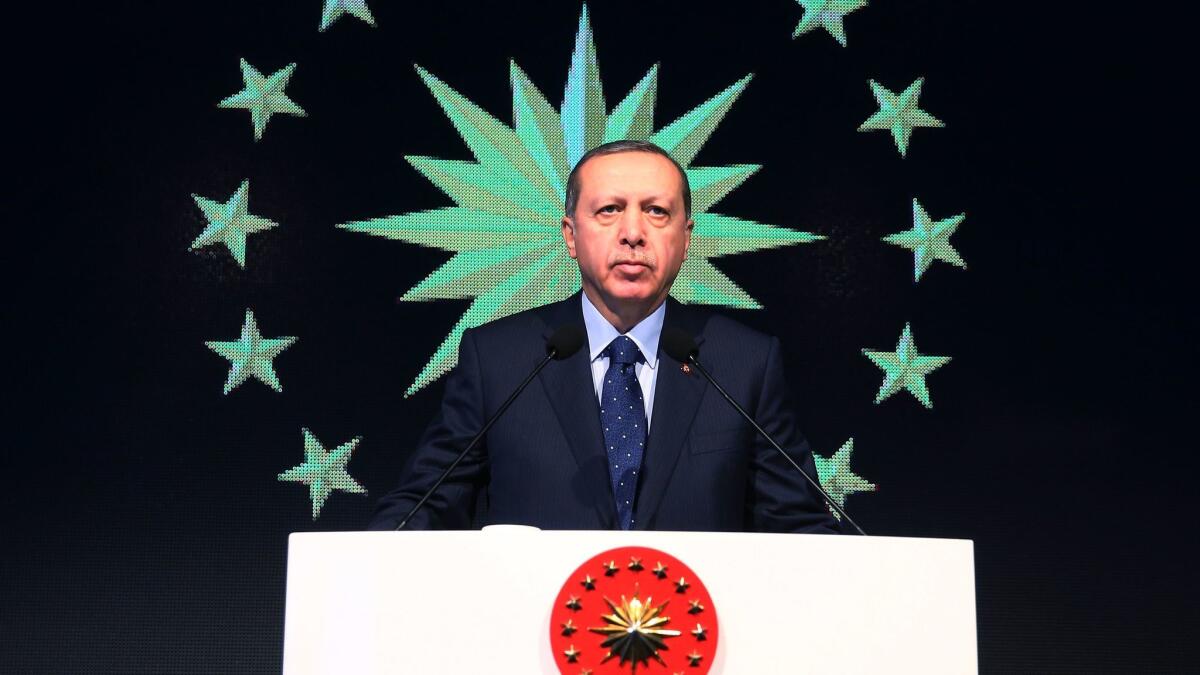As parliament bickers and brawls, Turkey’s Erdogan could be on the cusp of claiming vast new powers

- Share via
Reporting from Istanbul, Turkey — The Turkish parliament has given preliminary approval to a series of constitutional amendments that, if ratified in a national referendum, would mark the most significant shift in the country’s governance since its founder, Mustafa Kemal Ataturk, abolished the Ottoman caliphate nearly a century ago.
The 18-amendment package, expected to pass a final vote this week before the referendum, would consolidate power in the presidency, currently held by Recep Tayyip Erdogan.
His supporters say the new system created by the amendments will resemble the kind of executive government seen in the United States, and bring much needed stability to the country at a time of frequent terrorist attacks.
But critics say it will grant legal cover to Erdogan’s increasingly authoritarian style of leadership, taking vital powers away from the judicial and legislative branches and handing them to a populist leader who could rule for decades without challenge.
Erdogan’s ruling Justice and Development Party holds 317 of 550 seats in parliament, and it has allied itself with the Nationalist Movement Party, which holds 39 seats, to push through the amendments in contentious, often violent, debates over the last week that have gone into the wee hours of the morning.
It’s a very serious danger that our country will turn into the kind of dictatorial regimes we see all around us in the region.
— Fatma Hurriyet Kaplan, a lawmaker from the secular Republican People’s Party
“This new constitution will form a dictatorial government, a one-man government, like Hitler,” said Fatma Hurriyet Kaplan, a lawmaker from the secular Republican People’s Party, which holds 133 seats and is opposed to the amendments.
On Jan. 11, dozens of lawmakers from the ruling party confronted Kaplan, some raining blows on her head and neck that left bruises, after she attempted to videotape the group as members showed one another their ballots in favor of an amendment. According to parliamentary rules, the votes are to be done in secret.
Ruling party lawmakers “were going up one by one and showing each other their ballots to prove they were loyal,” she said. “It’s illegal.… I was recording them, and they didn’t like it.”
While members of Kaplan’s party voted against the amendments, the pro-Kurdish People’s Democratic Party, whose leadership has been jailed over charges of supporting the outlawed Kurdistan Workers Party, boycotted the vote altogether.
Brawls involving scores of lawmakers erupted at nearly every debate over the last week, with potted plants, notebooks and other stationery being hurled on live television. A ruling party lawmaker, brandishing a grisly wound on his shin he claimed was a human bite mark, demanded every Republican People’s Party member take a DNA test so he could determine who bit him.
The next day, members of the ruling Justice and Development Party, also known as the AKP, carried signs into parliament reading “No dogs allowed,” prompting Republican People’s Party members to bring their pet dogs along for the day.
The proposed amendments would eliminate the office of the prime minister, and transfer powers to appoint a Cabinet to the president, an office that is currently a ceremonial one, barred from maintaining a relationship with any political party.
The president would able to issue official decrees, legislation that would be legal as long as it does not infringe on individual rights enumerated in the current constitution. But the Constitutional Court, the bench that would decide the legality of the decrees, would also be controlled by the president under the new system, as would a body that appoints judges and prosecutors nationwide.
Erdogan, who led the country as prime minister from 2003 to 2014 and has been president since then, has long said a new constitution that accurately reflects the will of the country’s majority is the end goal of his political career.
“No one can stand in front of the new Turkey’s rise,” Erdogan said Saturday.
If the changes are approved in a referendum, which could come as early as March, Erdogan could rule the country with vast constitutional powers until 2029.
“It’s a very serious danger that our country will turn into the kind of dictatorial regimes we see all around us in the region,” said Kaplan.
But in Istanbul’s Kasimpasa neighborhood, where Erdogan grew up, residents have strung up banners welcoming the “Presidential Turkey.”
“I don’t see any danger with this system, it’s only dangerous if the person in charge is a traitor to our people and our religion,” said Mustafa, a shopkeeper in the conservative Fatih district who declined to give his last name. “Look at what Erdogan has done for us. He has transformed our economy, he is leading the Muslims. Let him rule for another 15 years, or longer. Who cares?”
At the heart of the campaign for handing Erdogan power is a populist desire to see the country in the hands of the pious, said Mustafa Akyol, a senior visiting fellow at the Freedom Project at Wellesley College in Massachusetts. The system created by Ataturk was fiercely secular, but Erdogan is an Islamist who has loosened restrictions on religion as part of a broader set of reforms. More recently, Erdogan has cracked down on dissent and is seen by some as a budding autocrat.
Erdogan’s political narrative, said Akyol, has worked “on a clear us-versus-them dichotomy, where ‘us’ is the real nation made up of conservative religious Turks, and ‘them’ are [a] secular, Westernized, degenerate elite. The presidential system is now offered as the final coffin on the hegemony of the old secular elite — or, in reverse, a guarantee that now the masters of Turkey will be religious conservatives spearheaded by Erdogan.”
But even among conservatives in Turkey, the proposed presidential system does not enjoy outright support.
“Basic non-negotiable conditions of separation of powers will be lost if these amendments are made,” said Temel Karamollaoglu, head of the ultra-conservative Saadet Party.
Saadet, which does not hold seats in parliament, was formed in 2001 by Islamist hard-liners after Erdogan’s more moderate cadre split from a parent Islamist party to form the AKP.
In letters as well as at a meeting with Erdogan before the parliamentary debate, Karamollaoglu said he “conveyed to the president that these changes will end up creating an authoritarian system that could harm us all.”
Farooq is a special correspondent.
ALSO
Eat, pray, love the Communist Party: a road trip through Tibetan lands, guided by China
One family fought the system and stopped Donald Trump’s first venture in India
More to Read
Sign up for Essential California
The most important California stories and recommendations in your inbox every morning.
You may occasionally receive promotional content from the Los Angeles Times.










